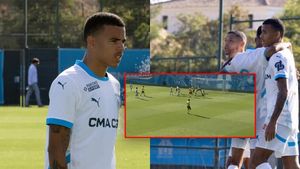Hannover – Public transport services have come to a halt in the capital of Lower Saxony as the union Verdi initiated a warning strike on Tuesday morning. This strike began at 3 AM, leading to the suspension of all Üstra bus and tram services throughout the Hannover area until the end of operation.
According to the Üstra, all their vehicles will remain parked at depots for the entirety of the strike, forcing commuters and students alike to seek alternative forms of transportation. "The Üstra requests passengers to use alternative transportation," the company said, expressing regrets for the inconvenience caused.
While the strike severely affects Üstra's operations, it's important to note other transportation options remain available. S-Bahn trains and regional trains continue running, as do the bus lines operated by Regiobus. The on-demand service Sprinti is also unaffected by this labor action. The union Verdi is aiming not only at Üstra but has also extended their strike to the energy company Enercity, as well as affecting waste management services operated by Aha.
Verdi's actions are part of broader labor negotiations for public service workers across Lower Saxony, wherein they demand wage increases of eight percent or at least 350 euros per month, alongside improved working conditions for apprentices. The non-fulfillment of earlier negotiation rounds has led to this escalation.
Verdi staged protests during the strike, with two significant marches occurring on Tuesday morning. One protest began at the Glocksee depot and the other at the northern shore of Maschsee, both routing to Goseriedeplatz, the city center. Union representatives rallied at the event, declaring, “We are demanding eight percent more salary,” and reinforcing their resolve for nearly immediate negotiations.
The impact on communication and transport cannot be ignored. For many commuters, particularly students, public transportation is the primary means of getting to school or work. The strike has thrown many schedules off-road, with parents now likely to rely more on car travel, thereby increasing traffic congestion. This situation is compounded by adverse weather conditions, with warnings issued for icy roads due to freezing rain and snow accumulation. "We are seeing significant ice on roads, which exacerbates the impact of the strike,” stated traffic management officials.
Separately, the waste management services by Aha are expected to be delayed, as workers participating in the protest may not be available for their regular duties. “Due to the strike, individual recycling centers may remain closed or experience delays in waste collection,” announced Aha's representatives, indicating possible service interruptions over the next few days.
For those needing immediate access to transportation, replacement buses were arranged for patients and workers of the Medical University of Hannover, linking the S-Bahn station Karl-Wiechert-Allee with the MHH campus. This decision is part of efforts to mitigate disruptions for healthcare services during this turbulent period.
Labor leaders have highlighted the precarious nature of their financial situations. Layoffs and budget scrutiny have been routine themes during negotiations. Despite the importance of public transportation and services, employers argue about maintaining financial responsibility amid tighter budget pressures.
While the strike is expected to end Wednesday at 3 AM, future negotiations are on the horizon. The second round of talks is scheduled to take place on February 17, reflecting the urgent need for both parties to engage meaningfully to combat the looming transportation crisis.
The community relies heavily on these public services. The results of negotiations and the resolution of the current work disputes will influence residents and employees’ daily lives significantly, with only time to reveal how this situation resolves.



